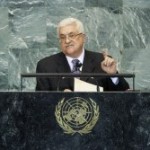Another showdown between the Palestinians and the United States could take place in a United Nations institution in the next few weeks, as a UN cultural body considers admitting “Palestine” as a member. The roughly two-week General Conference for the UN Educational, Scientific and Cultural Organization (UNESCO) began today in Paris, and on the agenda is the Palestinian membership bid.
However, the US has expressed its opposition to the move and there are potential consequences for American funding of UNESCO. This is a separate and much less significant matter than the Palestinian UN membership bid, which is still in the UN Security Council.
According to information from sources at UNESCO obtained by The Mideast Update, there is no set date yet for the UNESCO Palestinian vote, but that should be known by the end of this week. At this point it’s even unclear if or in what format a vote will take place.
According to the sources at UNESCO, the Palestinian issue is “on the agenda” for the General Conference, but as of now it would be “premature” to say with certainty how it will be handled. To achieve membership, the Palestinians need the approval of two-thirds of member states present and voting at the General Conference.
The UNESCO Executive Board recently recommended the General Conference admit “Palestine” as a member state. The US was among those who voted against that step and followed up on the vote by expressing it’s clear displeasure with the move, which it felt was premature considering the Palestinians are not even recognized as a state by the UN yet.
Technically some UNESCO members did join the body prior to achieving full UN membership, although their circumstances differed from the Palestinian situation. Currently the Palestinians hold an observer status, as does the Vatican. Full membership would allow participation in all of the various UNESCO activities and programs.
Amb. Alan Baker, former legal counsel of Israel’s Foreign Ministry and a former Israeli ambassador to Canada, told The Mideast Update via email earlier this month that the move would not have “legal significance” and is not a backdoor to statehood.
However, Amb. Baker, currently the director of the Institute for Contemporary Affairs at the Jerusalem Center for Public Affairs, did say in an email that it could serve as a precedent for “other UN specialized agencies” and the International Criminal Court (ICC). That could lead to serious diplomatic troubles for Israel.
The US, meanwhile, is concerned about the move escalating tensions as they attempt to revive the dormant peace process. Yet, regardless of the current American administration’s feelings on the step, UNESCO admitting “Palestine” would trigger US legislation suspending funding of UNESCO, according to The New York Times.
The US newspaper reported that the more than 15-years-old legislation calls for a complete halt in funding to any UN body that grants full membership to the Palestinians. The US currently provides UNESCO with 22 percent of their budget, around $70 million per year. The New York Times said the Obama administration does not want to see the legislation triggered. In light of that, some sort of arrangement or compromise could be reached over the Palestinian matter, although it is uncertain what steps would need to be taken to get around the American laws. It appears the US Congress would have to cancel the legislation for it to be avoided, and that likely will take time.
Regarding whether a vote could be delayed or the Palestinian membership deferred somehow, the UNESCO sources told The Mideast Update “it’s really up to the General Conference to decide” what it does with the matter.
The Palestinian Ma’an News Agency reported that Palestinian sources said one proposal mentioned is voting on the membership bid, with it taking effect six-to-nine months later. That should provide additional time for the Israel-Palestinian talks to potentially resume, as well as for the Palestinian UN membership track to run its course. The sources noted that could bring more European states to support the bid, but did not explicitly say if that would prevent the US from suspending its UNESCO funding.
While not confirming that specific scenario, The Mideast Update was informed by UNESCO sources that “some fairly intense negotiations” have taken place between the different parties concerned. The sources said those negotiations will “clearly have some bearing” on the options the General Conference discusses.
(By Joshua Spurlock, www.themideastupdate.com, October 25, 2011)

